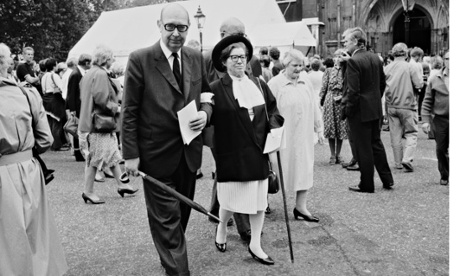
Philip Larkin was never treated with kid gloves by Britain’s media. Only last year, in a review of a biography of the poor sod, the Evening Standard described him as “widely viewed not just as racist, misogynist, porn-addled, devious in love, alcoholic, foul-mouthed and viciously right-wing, but also … dreary and twee with it” (even if they did add, “What’s not to like?”) The Scotsman summarised him, 10 years earlier, thus: “Misogynist, racist, loser – and poet”, before adding that he was also “a miserable old git” and a “creep of the first order”. It’s a particularly British way of memorialising somebody who, by creative rights at least, should be considered one of our national treasures.
Despite all of this, Larkin has managed to posthumously sweet-talk his way, through the medium of his emotionally honest and enduringly popular writing into Westminster Abbey’s Poets’ Corner. A memorial stone in the much-coveted area of the church’s cemetery is one of the highest honours that can be afforded to a writer – so naturally, Larkin, who turned down the nomination for an Oxford poetry professorship because his “idea of hell” was a literary party spent schmoozing and boozing with fellow poets, would have hated it.
In that way it is a particularly fitting fate for a poet who swung between sentimentality and cynicism like a crazed pendulum, unsure whether he hated too much or loved too much, whether eternal love existed or whether life and art was pointless and devoid of meaning (“Morning, noon & bloody night,/ Seven sodding days a week/ I slave at filthy WORK, that might/ Be done by any book-drunk freak./ This goes on until I kick the bucket/ FUCK IT FUCK IT FUCK IT FUCK IT.”)
So, considering how ambivalent he himself would probably have felt about it, does Larkin’s memorial stone belong in Poets’ Corner? Personally, I’d rather see him remembered somewhere a little less austere. Beyond the obvious problems of associations with the church, considering that Larkin was, oxymoronically, a fairly committed agnostic, Westminster Abbey’s final resting place for great writers past is a bit of an old boys’ club. It’s notoriously overcrowded, with a skewed filtering system. And its inclusion of poets like Oscar Wilde (deathbed Catholic conversion) and WH Auden (happy to declare himself a Christian in one place and muse that theology was all a mad joke made up by confused humans elsewhere) is downright uncomfortable. I would much rather visit memorials to these gentle souls in a place less associated with creative repression, homophobia and absolutist thought.
I doubt Larkin would ever have taken to me, if his letters to his lover Monica are anything to go by. In them, he admonishes her for having too many loud opinions and advises that she only speak two sentences at a time, preferably keeping her tone sweet and a little less strident. The release of these letters in the 90s was the beginning of the downfall of his public persona, somewhat deservedly – there’s no doubt that sexism underlies his assertions. Nevertheless, I feel compelled to use my public platform as an opinionated female to step in on his behalf. He – and more importantly, the people left behind him who admire his writing so much – deserves a resting place as open to interpretation as his poetry was. A neutral space, which allows for undirected, untainted remembrance of a complicated human being.
The time for the church to decide upon who makes the history books and who doesn’t has passed. Instead, it would do us all a cultural service to construct a final resting place for writers whose relationship with religion was not entirely straightforward: somewhere humanist rather than atheist; open and inviting, rather than strictly controlled; and above all spacious, since hopefully England hasn’t quite finished producing poets and novelists of great repute.
Larkin may have been a grumpy, prejudiced curmudgeon, but he was our grumpy, prejudiced curmudgeon. He belongs in a place that doesn’t skate over the difficulties of life, rather than a place that includes him so long as its keepers can ignore his more demanding questions and falsely amplify the more virtuous parts of his legacy. I liked Larkin as a writer, who stared the more disgusting and inconvenient elements of life in the face and then swore liberally about them in uncompromising verse. On a personal level, I’m not sure we’d have got on. But I can’t stand to see him memorialised in a space so antithetical to the no-bullshit ideology he lived his creative life by.
Of a tomb he saw, constructed to commemorate a couple’s life together, Larkin wrote, “Time has transfigured them into/ Untruth.” False monuments which smooth over death and therefore the life that came before it, he told us, are bizarre liars. What remains of us is love – and for the people who loved Larkin’s words, Poets’ Corner just isn’t enough.

